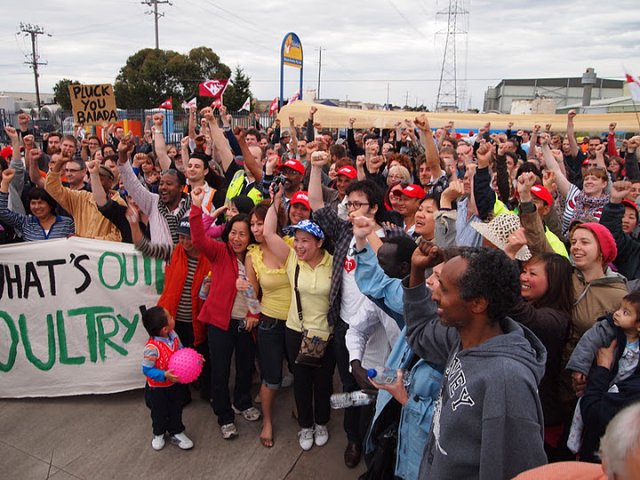
After 13 days of an around-the-clock picket line, the workers at poultry company Baiada in Laverton North have won a tremendous victory. Baiada was well known as having the worst pay and conditions of all poultry processing companies.
At a victory celebration, National Union of Workers (NUW) organiser for the site, Godfrey Moase, said: “Let’s hope that this is the start of something for the labor movement in this country, because we desperately need to move forward if we’re to keep up any kind of progress like this, because one thing’s for sure, if that’s going to happen, we can’t stay where we are now.”
NUW delegate Abdul Rahman told the supporters that the dispute had “changed the culture at Baiada. Workers regard themselves differently” because they had stood up to the company.
Rahman said the combined effort of workers, the community and the unions had brought about the victory. He hoped the strong show of support for job security shown at Baiada would benefit the wider Australian community.
Moase said that since returning to work, the workers had a meeting with management in the lunchroom. The workers spontaneously broke into the chant: “The workers united, shall never be defeated.”
Deplorable conditions inside the factory, combined with below minimum wages, pushed workers as far as they could go before they took industrial action. The NUW, which represented the Baiada workers, say at least 10% of the factory’s mostly migrant workforce was absent at any one time due to work related injuries and illnesses.
But cuts, scrapes and bruises on the production line were the least of the workforce’s concerns.
What really sparked the strike was the workplace death of Sarel Singh. Singh’s colleagues say the death was a result of Baiada management’s cost cutting measures.
Management refused to let Singh shut down a chicken packing machine for a short period for him to clean it. He therefore had to clean the machine while it was still running, which caused his death by decapitation.
Workers at the picket said that when their colleague was killed in the accident, they had to hose down the machine and restart work within two hours. Before the dispute started, Baiada workers reported they still had to clean the machines while they were running.
Workers present at the picket raised allegations of bullying, sexual harassment and assaults by factory management.
The Baiada workers victory won more than many had expected. After negotiations, the company agreed to a new enterprise bargaining agreement that improves pay and conditions.
Earlier in the dispute, management said it would agree to no more than a 3% pay increase for permanent staff and refused to discuss pay and conditions with casual contract staff.

Under Baiada’s casual contracting arrangements, some workers were paid as little as $8 an hour.
Earlier on, management also tried to keep delivery drivers — who have not seen a pay rise in five years — out of the bargaining process.
The new agreement gives factory staff a 8% pay rise over two years and says contract or casual labour will be paid no less than permanent employees.
Delivery drivers are covered by the agreement. The injury pay rate is now 100% of regular pay, rather than the 80% Baiada management wanted.
Elected union delegates at the Baiada factory can undertake 200 hours of paid union training a year. Delegates will also be allowed to help organise other chicken processing plants without loss of pay.
After the victory, Victorian NUW state secretary Tim Kennedy thanked the workers, unionists, political activists and community groups who had supported the Baiada workers’ picket. He said the result wouldn’t have been possible without the combined effort.
He made a point to thank long-time trade union activist Dave Kerin for his organising role on the picket line.
The Baiada dispute is proof of several things. It shows class struggle unionism, rather than playing by the rules of bosses, bureaucrats and Fair Work Australia, is the way to win.
It also shows reaching out to the wider community and union movement is vital for winning a serious dispute or picket. The wide support helped swing the pendulum in favour of the workers.
The outward-looking approach taken by those involved in the dispute was essential to draw solidarity from the rest of the movement, keep the strikers’ spirits high and ensure enough people were there to staff the picket.
Baiada worker and delegate Gabriel mentioned these factors at the victory celebration. But he also said the support and solidarity shown by the Occupy protests in Melbourne and Sydney was important.
Occupy’s support for the Baiada dispute was fitting given that the company-owners are certainly a part of the 1%.
The Baiada struggle proved many things, but overall it showed that if you don’t fight, you lose.